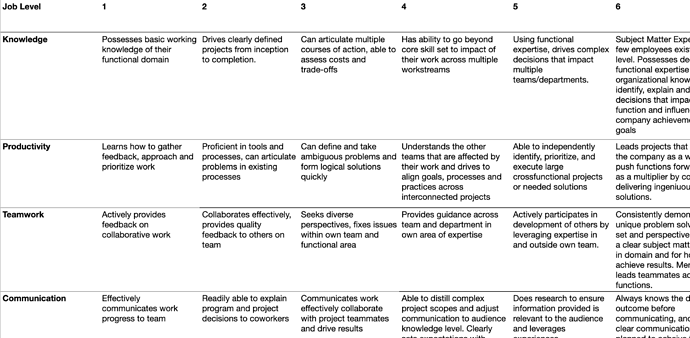I would like to offer a few comments here.
from @lefterisjp comments:
Good software is built by 1-2 architects/CTO and a small, lean and effective development team.
I don’t think a DAO can build good software. Perhaps it can hire a team that will be able to and maybe create a very good and clear specification for them to implement.
My understanding is that a DAO is “just” the organization model for running a project, the same that it could be an LLC. With so many people here involved in open software, and this being an important factor in the mission, how can we reach this conclusion? Aren’t there enough examples of good running open-source projects with high quality? (Linux, Gnome, WordPress, IETF, etc). Note, that I’m asking from total unknowledge, I never participated in an open-source project.
Btw, not sure if this could help: https://portal.devxdao.com/public-proposals/185
From @owocki :
Lefteris has told me privately that full-time contributors to Rotki make $30k - $50k per year.
I’m in Europe too, we hire globally, and I’m not even able to attract juniors for a $30k salary. Our seniors are around $80k, and if I find a superstar is almost free check. I’m a startup with no too many resources, so imagine with what we are competing for talent. And I don’t believe that we would attract that talent just because they are aligned with the mission, people want/need to secure their future.
I think the tech market is currently in a bubble and it doesn’t look like it’s gonna explode at any time soon.
On top of that, working for DAOs has many advantages, you can work for many DAOs at the same time ( this may be an advantage for the person, but I don’t think it is for the DAO, from my point of view if we detect good people, we want them 100% focus on us, and in their free time, enjoying their life, so they can recharge and come with energy the next day, maybe this is an old-fashing though). But it also has many risks from a stability perspective: I have one task now, but It’s not sure at all that I would have a new task once a finish this. So I would have to go out there hunting for new bounties, grants, or freelance jobs. What about illness? pregnancy, vacations, holidays? Along these lines, I was thinking about something to introduce some kind of recognition for the track record of a contributor: Hey, you have been here for 3 months, doing an excellent job, here you have an NFT, that you can exchange, at any time, for 2 days off (numbers from the example are just random). This could create loyalty from the contributors, and people may value this on top of just salary/reward.
@kyle :
I am starting to really see the value in some “stable” portion of compensation, and then a “variable” portion of compensation. Having to sell your voice (aka, governance tokens) to pay bills doesn’t feel good.
I totally agree that people should sacrifice compensation for having a voice.
This may be a total change of subject, but I’m investigating an alternative to 1-token-1-vote governance model. I like more a system based on reputation, where your reputation’s score rewards your alignment with the mission and penalizes the opposite. Those reputation points can’t be lifetime, I think they should work like the ATP ranking. So people needs to contribute constantly during periods of time, in order to keep their scoring, instead of doing one task and living from that reputation for the rest of their days.
@bhargavaparoksham :
Even in a worst case scenario of GTC going to $1 to 1.5 the dao will have ~$50 to $75 million (vested + unvested) in its treasury. So if we cap max spending at lets say 1.5 mil per season. Then even for 3 yrs (12 seasons) DAO would at max spend 18 mil i.e ~30-40% of treasury and hopefully by the end of 3 years we would be out of the bear market. In case if the market conditions improve we can remove the spending limit early.
I think this is very short term vision. It doesn’t matter if this bear market last 3 years or the next one, or maybe there are some external factors that dump the price to zero. The DAO should look for a way to increase its revenue and be auto-sustainable.
Managing the treasury and being sure that it can resist market conditions is one piece, but sooner or later, the treasury will be gone.
Some quick ideas:
- Looks for financial contributors, there are a lot of non-profit organizations and foundations raising funds from wealthy people.
- What about taking tokens/equity from the projects that the DAO helps?
- I think there is a lot of knowledge in this DAO, many other DAOs can learn from it (I’m researching this in detail for the one that I’m creating). This DAO can create tools and service that facilitate the management of this DAO and charge for it to other DAOs.
